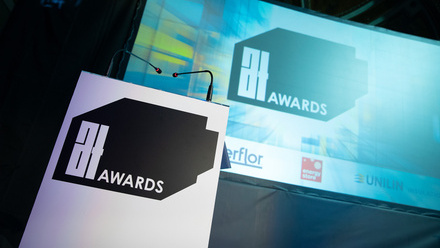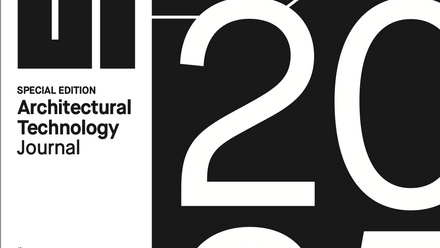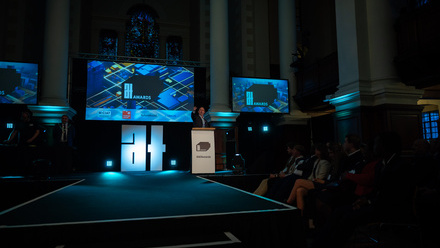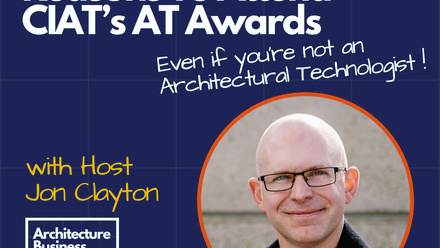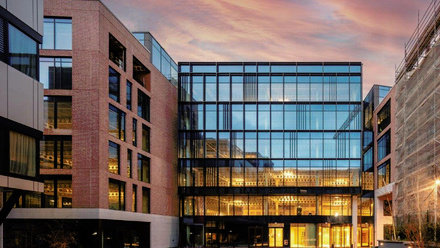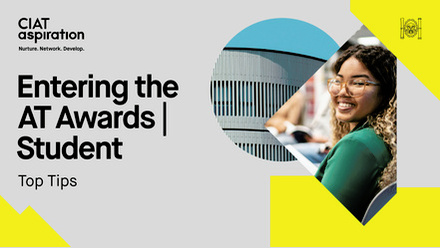AT Awards: 2021 winners
Presented by CIAT President Eddie Weir on 22 October 2021, the Awards celebrate outstanding achievements in Architectural Technology for both students and practitioners.
The online event, hosted by Matt Allwright, was attended by a cross section from the built environment sector and showcased Architectural Technology, both in practise and as a key academic discipline, demonstrating the growth and impact within the UK and internationally. It can be viewed in its entirety here: www.youtube.com/watch?v=N6ENvT58UZ8
The 2021 winners are:
The Chartered Architectural Technologist of the Year Award
Winner: Tom Gray MCIAT, Chartered Architectural Technologist
Tom is a talented Architectural Technology professional with a profound conviction for the technology of architecture and an absolute dedication to the discipline of Architectural Technology. He is enthusiastic, always up for a challenge, ready to dedicate himself for promotion of the profession. He commits his personal time to provide services that he believes will not only help him grow and succeed even further but also help the community.
The President's Medal
Winner: Professor Sam Allwinkle PPBIAT FCIAT, Chartered Architectural Technologist
From the President, Eddie Weir's citation:
Since I joined the Institute in 2001, I have witnessed first-hand what Sam Allwinkle has done for the profession and discipline, and I am also very aware of his significant contribution prior to me joining. The longevity of Sam's commitment, drive, enthusiasm and motivation of others is truly remarkable; he has been a role model for me and many of my colleagues.
There are many examples which could be cited demonstrating Sam's achievements for Architectural Technology, the discipline and profession, both past and present, and activities he is involved in to ensure the profession is at the forefront, take on the real challenges and provide solutions within the sector.
Known for his professionalism, wise counsel and generosity, Sam has been responsible for laying the foundations for many practising Architectural Technology professionals, having trailblazed the development of undergraduate and postgraduate degree programmes in the discipline and establishing CIAT Centre of Excellence status.
I am honoured to be the the first to present the President's Medal and to its inaugural recipient – Sam, for his extensive contributions to the development of Architectural Technology, as a discipline as well as a profession, both in the UK and internationally.
The Gold Award
Winner: Usman Yaqub FCIAT, Chartered Architectural Technologist
The 86th recipient of the Gold Award is Usman Yaqub FCIAT for significant contribution to the Wessex Region and Institute with his implementation of a newly reinvigorated CPD series which has significantly impacted engagement within the Wessex Region and on both a national and global scale.
The Emerging Talent in the Technology of Architecture Award
Winner: Matthew Willemsen MCIAT, Chartered Architectural Technologist
Matt's efforts as a Chartered Architectural Technologist are hallmarked with an assiduous and conscientious nature. His proactive determination leads to an infectious enthusiasm towards the task at hand and his dislike for accusations furthers an open and welcoming cooperation to achievement as a team whether leading or not. His self-disciplined high standards drive a desire to always improve and share in the experiences he has been through for the improvement to others.
The Award for Excellence in Architectural Technology | Small to Medium
Winner: King Street, Kings Lynn, Studio 11 Architecture
Built on a plot in the centre of Kings Lynn, overlooking the River Great Ouse, this fantastic solid design, whilst simple, has addressed and tackled issues on a brownfield site. The Chartered Architectural Technologist has successfully created modern living with a twist, with excellent eco-credentials, over and above expectations for a build of this size.
The building has been designed to sit skilfully, and integrate, within the historic context and whilst traditional in its form, exploits the opportunity of modern materials. The site had several constraints and challenges which were taken into careful consideration and profoundly executed. The selection of structural design, materials, size, delivery to site and construction has been expertly reviewed and incorporated within the design, also allowing flexibility for its layout to accommodate any future needs.
This is a superb demonstration of how Architectural Technology has supported the design, making it an outstanding winner for the Award for Excellence in Architectural Technology, small to medium projects category.
Highly Commended: Errisbeg House Veterinary Hospital, Urban Designs Ltd
New premises to accommodate the expanding operation of this veterinary hospital resulted in this purpose designed building. Throughout, there was a careful considered approach, particularly to the workstations within the treatment areas. The extensive client staff involvement has benefitted the design along with a fine use of 3D modelling and technology to realise it.
The visual structural connection is a fine example of Architectural Technology in practice utilising local materials with robust fucntional internal surfacing and a sound technical response to a tricky host property and site. A proficient use of the glulam and steel frame off-site manufacturing with traditional masonry construction methods for the building envelope.
Commended: Vinery Mews, PiP Architecture
A converted dilapidated warehouse building into an open plan office with a terrific layout making maximum use of the natural light. A clever solution with use and exploitation of existing building features; making this project visually strong and an inviting design with excellent reuse of an existing building. An innovative use of materials by the Chartered Architectural Technologist, with excellent simple and clear detailing of building elements, integrating nicely with its surroundings.
The Award for Excellence in Architectural Technology | Medium to Mega
Winner: Rosalind Franklin Institute, IBI Group
The Rosalind Franklin Institute provides flexible workspace options for academic tenants which flex and respond to different requirements over time. The fantastic fabric first approach will ensure longevity in the building's use. Its excellent use of 3D modelling demonstrated during the design and delivery stages, and within a very tight programme, provides an expertly thought-out design addressing specific functional requirements.
There was great attention to detail which allowed high levels of energy reduction to be achieved and a passive approach which achieved daylight provision and reduce solar gains. Working to a very constrained brief, with mitigation measures for water and vibration damage, they used offsite manufacturing with a traditional concrete frame.
All aspects of this project demonstrated technical excellence and as such is an outstanding winner of the Award for Excellence in Architectural Technology in the medium to mega category.
Highly Commended: Sir Bobby Robson School, Concertus Design & Property Consultants
Sir Bobby Robson School is a purpose-built school and as such is a fantastic local facility with innovation, functionality and inclusivity considered early in the project and throughout all the design decisions.
A robust approach to the design and delivery with carefully selected materials made this a functional school building, whilst working within a tight budget and constraints. The outstanding use of BIM and thermal modelling technology approach led to a highly sustainable design and its integration has had a positive impact for this project. A fine example of Architectural Technology in action.
Commended: Madingley Road, PiP Architecture
These striking purpose-built apartments, with a modernist residential design concept, are attractive and a very modern approach to UK apartment living. With the use of an air source heat pump with mechanical heat recovery ventilation technology, the Chartered Architectural Technologist has incorporated a great approach to carbon responsbility. Carefully considered selection of materials with clean detailing and design lines ensures a quality finish of both indoor and outdoor spaces.
The Student Award for Excellence in Architectural Technology | Project (recognising outstanding design achievement in Architectural Technology based upon a university/college assignment)
Winner: Eco-Quarter: Sustainability Hub, Craig John Gregory, Nottingham Trent University
Craig's communal hub for the Trent Basin Residential Scheme is an excellently considered, highly technical, ecological and inclusive design – it is practical, yet exciting!
The design and material specification are superb, including accessiblity considerations scoped within the context plans as well as a fire strategy. A high level of sustainability opportunities detailed and expertly presented. BREEAM rating and acknowledgement of the credits calculation system is treatment to Craig's understanding of sustainable and green building design. The different spaces, overall development usage and level of thought considering the clients requirements is excellent. There is a clear understanding of the optimised design from the proposed ME and circulation GIA percentage targets.
There is great care and attention in the gorgeous detailing, the fabric-first approach and the ecological choices made in relation to the structure, the fabric, and the services in this design. Craig is a technically driven individual who has demonstrated excellence in Architectural Technology and a very worthy joint winner.
Winner: Strawberry Hill Healthcare Village, Luke Williams, Nottingham Trent University
Strawberry Hill is a new healthcare village which is visually striking. Luke has approached this project with mature, considered and resolved detailing and a lot of work has gone into developing its fantastic design.
The building form, spread and use of the land is impressive and Luke demonstrates the importance to designing a building that fits and respects the ecological and clients' requirements. Of particular interest was the falling/returning to earth forms and these were exceptionally presented. Luke has a further benefit for prevailing wind and an opportunity to harvest this as part of the sustainability design – quality design that is also sustainable is hard to achieve. The overall structural concept is well thought through and coordinates with the architectural design. The level of detail resolution is impressive and superbly presented.
On sustainability, Luke goes into detail on the project targets and key areas he proposes to meet the BREEAM targets. This being one of the main drivers, including the detail resolution, make this project standout as a joint winner for the Student Award for Excellence in Architectural Technology.
Highly Commended: The Home Office Project, Harvey Hale ACIAT, Anglia Ruskin University
Harvey has created a very challenging and interesting mixed-use development scheme that allows professionals and their families to live and work within a resilient community. To address a work-life balance using the current economic crisis is a brilliant concept, as well as the overall targets to provide a sustainable and technically resolved project, was successfully achieved and presented superbly.
Harvey covers a lot of items throughout the report and drawing sheets, demonstrating technical excellence. From hand sketch isometrics to fully resolved technical solutions and amplification details, it was interesting to explore the layers and overall approach taken using the materials and integration of sustainable systems. One standout detail is the section providing an overall sustainability approach/systems adopted for the project. The work is a real showpiece.
Student Award for Excellence in Architectural Technology | Report (recognising outstanding research achievement in Architectural Technology from a dissertation assignment)
Winner: Space Layout Design: Developing a Workflow to Enable Communication to Those With Autism Spectrum Disorder, Investigating the Potential Use of Augmented Reality, Josephine McGoldrick, Ulster University
Josephine's report on developing a technological workflow to enable communication to those with Autism Spectrum Disorder is a wonderful piece that demonstrates the potential use of technology to not only help the client, but also specific end users at all stages of the design process; and afterwards as buildings, spaces and functions adapt over time.
The report is superbly written and researched with clear aims and objectives set from the outset. The literature is well introduced and covers the subject area coherently with an appropriate narrative. Using an excellent and clear methodological approach the diagrams used explain the desk-based analysis.
This work is a brilliant example of excellence in Architectural Technology and an exemplar for the Student Award Report category.
Highly Commended: A Pairs Comparison and Analysis of Current 3D Printing Construction Technologies in Coherence with Industry Defined Innovation Value Drivers, Aaron Richardson, Strathclyde University
A timely and worthwhile topic from Aaron to research 3D printing construction technologies in the current construction climates and under COVID-19 conditions.
Despite limitation imposed by the pandemic, Aaron has managed to conduct a robust and well-structured research. With a sound and rigorous literature review carried out, this has helped ground the research in the existing body of knowledge in this area. The methodology is proportionate, meets the research design and helps achieve the intended promise of the study. Excellently written and a fascinating report for those in the Architectural Technology discipline.
Commended: A Technical Study Exploring the Use of Re-Purposed Aggregates and Cement Along with Curing Techniques to Create Concrete to Different Design Strengths For Use in a Theatre, Daniel Green, Coventry University
Daniel's report explores the appropriateness of recycled tire aggregate and fly ash as recyclable aggregate and cement alternatives. His research was well-structured, clear and easy to follow.
He has taken on a relevant and new area, managing to undertake a methological approach to deliver the aim and objectives and the research's intended outcomes. Daniel has made some interesting conclusions and recommendations which will be of significance to anyone within the Architectural Technology discipline.
All the Awards, Finalists and winners are featured on our website here and in the winter issue of AT Journal.
The AT Awards reopen on 1 February 2022.

